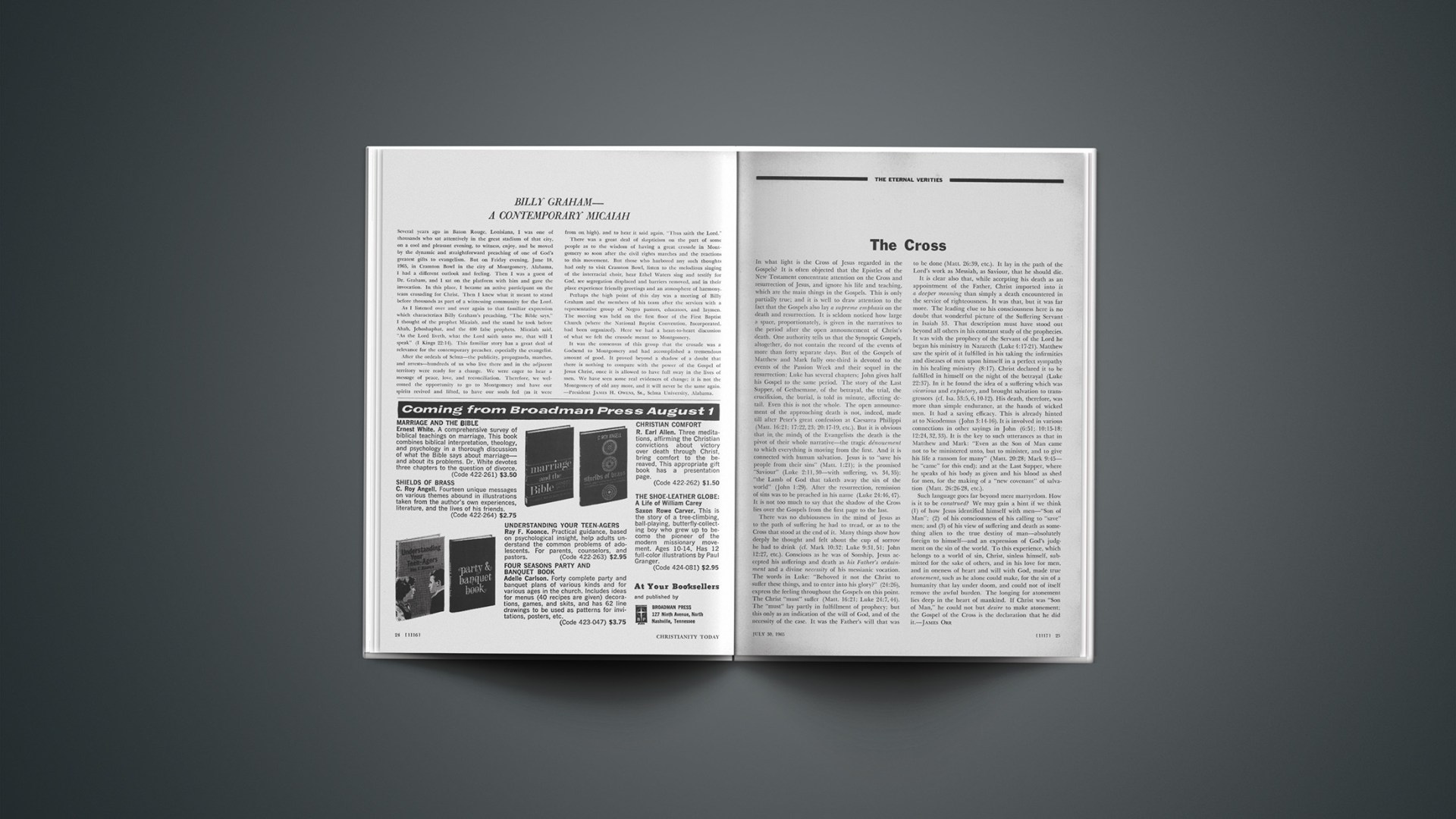The Cross
In what light is the Cross of Jesus regarded in the Gospels? It is often objected that the Epistles of the New Testament concentrate attention on the Cross and resurrection of Jesus, and ignore his life and teaching, which are the main things in the Gospels. This is only partially true; and it is well to draw attention to the fact that the Gospels also lay a supreme emphasis on the death and resurrection. It is seldom noticed how large a space, proportionately, is given in the narratives to the period after the open announcement of Christ’s death. One authority tells us that the Synoptic Gospels, altogether, do not contain the record of the events of more than forty separate days. But of the Gospels of Matthew and Mark fully one-third is devoted to the events of the Passion Week and their sequel in the resurrection; Luke has several chapters; John gives half his Gospel to the same period. The story of the Last Supper, of Gethsemane, of the betrayal, the trial, the crucifixion, the burial, is told in minute, affecting detail. Even this is not the whole. The open announcement of the approaching death is not, indeed, made till after Peter’s great confession at Caesarea Philippi (Matt. 16:21; 17:22, 23; 20:17–19, etc.). But it is obvious that in the minds of the Evangelists the death is the pivot of their whole narrative—the tragic dénouement to which everything is moving from the first. And it is connected with human salvation. Jesus is to “save his people from their sins” (Matt. 1:21); is the promised “Saviour” (Luke 2:11, 30—with suffering, vs. 34, 35); “the Lamb of God that taketh away the sin of the world” (John 1:29). After the resurrection, remission of sins was to be preached in his name (Luke 24:46, 47). It is not too much to say that the shadow of the Cross lies over the Gospels from the first page to the last.
There was no dubiousness in the mind of Jesus as to the path of suffering he had to tread, or as to the Cross that stood at the end of it. Many things show how deeply he thought and felt about the cup of sorrow he had to drink (cf. Mark 10:32: Luke 9:31, 51; John 12:27, etc.). Conscious as he was of Sonship, Jesus accepted his sufferings and death as his Father’s ordainment and a divine necessity of his messianic vocation. The words in Luke: “Behoved it not the Christ to suffer these things, and to enter into his glory?” (24:26), express the feeling throughout the Gospels on this point. The Christ “must” suffer (Matt. 16:21; Luke 24:7, 44). The “must” lay partly in fulfillment of prophecy; but this only as an indication of the will of God, and of the necessity of the case. It was the Father’s will that was to be done (Matt. 26:39, etc.). It lay in the path of the Lord’s work as Messiah, as Saviour, that he should die.
It is clear also that, while accepting his death as an appointment of the Father, Christ imported into it a deeper meaning than simply a death encountered in the service of righteousness. It was that, but it was far more. The leading clue to his consciousness here is no doubt that wonderful picture of the Suffering Servant in Isaiah 53. That description must have stood out beyond all others in his constant study of the prophecies. It was with the prophecy of the Servant of the Lord he began his ministry in Nazareth (Luke 4:17–21). Matthew saw the spirit of it fulfilled in his taking the infirmities and diseases of men upon himself in a perfect sympathy in his healing ministry (8:17). Christ declared it to be fulfilled in himself on the night of the betrayal (Luke 22:37). In it he found the idea of a suffering which was vicarious and expiatory, and brought salvation to transgressors (cf. Isa. 53:5, 6, 10–12). His death, therefore, was more than simple endurance, at the hands of wicked men. It had a saving efficacy. This is already hinted at to Nicodemus (John 3:14–16). It is involved in various connections in other sayings in John (6:51; 10:15–18; 12:24, 32, 33). It is the key to such utterances as that in Matthew and Mark: “Even as the Son of Man came not to be ministered unto, but to minister, and to give his life a ransom for many” (Matt. 20:28; Mark 9:45—he “came” for this end); and at the Last Supper, where he speaks of his body as given and his blood as shed for men, for the making of a “new covenant” of salvation (Matt. 26:26–28, etc.).
Such language goes far beyond mere martyrdom. How is it to be construed? We may gain a hint if we think (1) of how Jesus identified himself with men—“Son of Man”; (2) of his consciousness of his calling to “save” men; and (3) of his view of suffering and death as something alien to the true destiny of man—absolutely foreign to himself—and an expression of God’s judgment on the sin of the world. To this experience, which belongs to a world of sin, Christ, sinless himself, submitted for the sake of others, and in his love for men, and in oneness of heart and will with God, made true atonement, such as he alone could make, for the sin of a humanity that lay under doom, and could not of itself remove the awful burden. The longing for atonement lies deep in the heart of mankind. If Christ was “Son of Man,” he could not but desire to make atonement; the Gospel of the Cross is the declaration that he did it.—JAMES ORR










